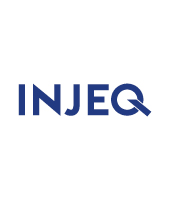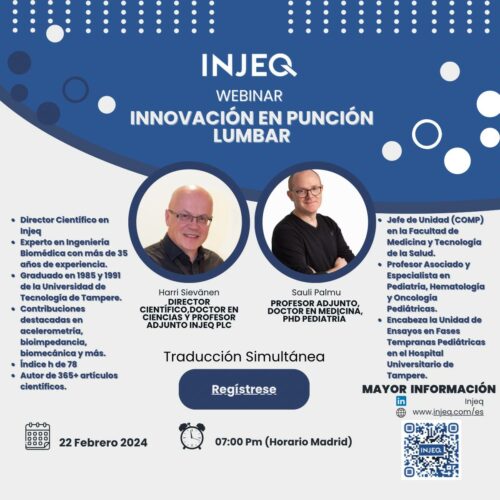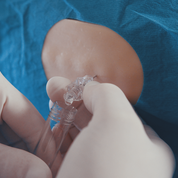Imagine if doctors had a needle that could precisely identify when the tip reaches the right spot? That is the vision that sparked Injeq’s groundbreaking development work, the result of which is the first smart needle of its kind in the world.
The smart needle has been developed since 2003 by Injeq’s interdisciplinary team that combines solid medical and technological expertise. Katja Paassilta (DDS, MSc Eng), Riitta Seppänen-Kaijansinkko (MD, DDS, PhD, Prof) and Jari Hyttinen (DSc Tech, Prof), along with their teams, have carried out pioneering work to develop the bioimpedance-based measurement technology.
The very first prototype of the device was made using a commercial hypodermic needle and components purchased from an electronics store. Paassilta performed the first test punctures in her home, on gel tissue she made from gelatin.
Now, two decades later, the smart needle and the measurement unit connected to it include advanced technology and a unique measurement method in which the sensors and the entire measurement configuration are located in the tip of the needle.
The electrodes on the tip release a small electric current to the tissue surrounding the tip. The device, which precisely measures the tissue’s electrical conductivity at several different frequencies, identifies when the tip of the needle is exactly at the right puncture point. The device then sends an audio alert to the physician.
The measurement device can also be used in clinical studies and in teaching situations to collect data generated by the needle, thus enabling the entire puncture procedure to be analyzed in retrospect.
The first application of Injeq’s smart needle to be commercialized was developed in collaboration with oncologists and pediatricians particularly for the treatment of childhood leukemia. During the treatment of leukemia, dozens of lumbar punctures (spinal taps) are performed on the patient in order to take cerebrospinal fluid samples and to inject chemotherapy drugs into the spinal canal to kill cancer cells.
Injeq’s smart needle is currently being tested on leukemia patients in three central university hospitals in Finland. The clinical study, which has already seen more than 140 punctures performed in clinical tests, has been proceeding well.
Medicine has advanced in leaps and bounds over the past 100 years, but the needles used for performing punctures have evolved very little during that time. Injeq is finally bringing needles and the safety of punctures into this millennium.



